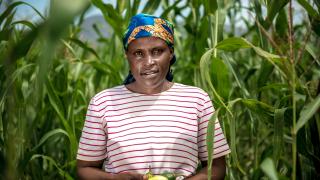20 Years On from the Kasika Massacre, Women Survivors Share Their Stories
To mark the International Day for the Elimination of Sexual Violence in Conflict, we spoke to two women in our training programme who have chosen to speak out about their experiences.
Wabiwa
My name is Wabiwa. I am 38 years old. I grew up in Kasika with my mother.
My father died early leaving many children – there were 9 of us. My mother tried to send us to school, but she could not afford all the school fees. I left school and got married… the war started just after that.
My husband and I made a living by brewing traditional beer and selling it by the road. We worked hard, but still struggled to afford basic necessities like salt and soap.
However, our neighbours became jealous (of our business) and made accusations against us to the rebels.
Our house was burned down and one of my children and my brother were killed. I was stripped naked and walked through the village while being beaten. I was shamed in front of my children, family members and the all community.
Since then, I still see the images of what happened. Whenever I see a soldier I am afraid.
Machozi
If the soldiers liked a woman, they would take her away and rape her. Those who were not chosen were beaten and all their possessions were stolen... I was taken to the forest and raped.
Our Work and Sexual Violence in Conflict
Join the Movement to Eliminate Sexual Violence in Conflict
- Help us raise the voices of survivors by sharing Wabiwa and Machozi’s stories with your friends and social networks
- Learn more about the issue of sexual violence in conflict and read our recommendations for tackling the problem, based on evidence working with more than 495,000 marginalised women survivors of war since 1993
- Stand with a woman survivor of war through our year-long training programme. Right now, thousands of women like Wabiwa and Machozi are in desperate need of support in the aftermath of trauma - a monthly donation of £22 will help provide one woman with skills, knowledge and a safe space to begin rebuilding her life.
Learn More
Players of People's Postcode Lottery
subtitle:
Since 2017, we've been partnering with People's Postcode Lottery to help women in conflict zones develop skills, access power and transform their lives. In 2022, funds raised by players will support women in Afghanistan, Iraq, Nigeria and South Sudan through our programme.
Since 2004, Women for Women International - Democratic Republic of Congo has reached more than 110,419 women.


